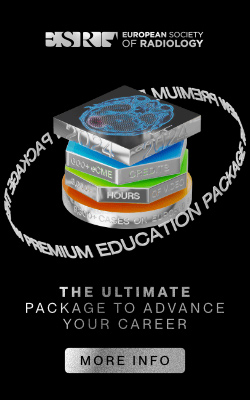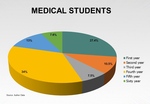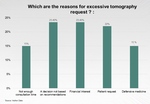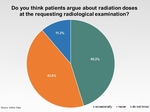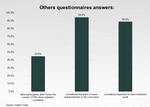Congress:
EuroSafe Imaging 2020
Keywords:
Performed at one institution, Cross-sectional study, Prospective, Quality assurance, Patterns of Care, Education and training, Radiation safety, Education, Diagnostic procedure, Digital radiography, CT, Conventional radiography, Radioprotection / Radiation dose, Professional issues, eHealth, Professional Issues
Authors:
M. Bernardo, A. A. S. M. D. Santos, M. L. Gozzano, F. Morgado, F. A. Almeida, A. Mekhitarian, D. M. Sales, C. I. S. Rodrigues
DOI:
10.26044/esi2020/ESI-05397
Description of activity and work performed
Study design: pilot quantitative cross-sectional study approved by the University ethical committee.
The 10-question paper multi-choice pilot survey to assess the knowledge of ionizing radiation in radiologic examinations, based on international campaigns and International Atomic Energy Agency, validated by three specialists, was applied randomically to 150 medical students (first to sixt year class) and 35 residents (internal medicine: 88,9% and radiology:11,1%) in 2019. Statistical analyses performed.
RESULTS:
- The majority (75,7%) of the participants answered that physicians overuse radiological exams, attributed mostly by : not enough consultation time (15%), a decision not based on recommendations (23,4%), financial interest (23,4%), patient request (22%) and defensive medicine (16,2%).
- Mostly (60,7%) considered it important to ask for previous radiological exams before requesting new ones and 31,7% considered it occasionally important.
- Most of the participants (96,3%) considered it important to have an information access system about patient's previous exams, but rarely have it available.
- Quite of the participants (46,7%) normally give a justification, but a few (11,2%) think it shouldn´t be mandatory.
- Most of the participants (44,9%) didn’t know the correct CT/RX dose radiation correlation.
- 94,4% considered important to have radioprotection in the curriculum and also 88,8% to have an institution audit.
- 60,7% answered that abdominal CT promotes more radiation dose than radiography exams, but a few (11,2%) answered that magnetic resonance does it. Feedback activities was done.
- 72% considered that children are more sensitive than adults to radiation effect.
